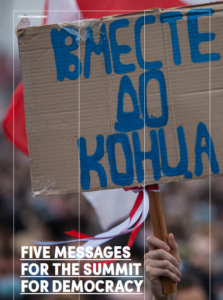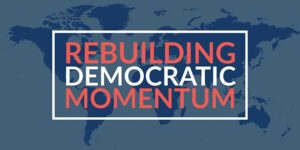Although the full impact of December’s Summit for Democracy remains unclear, the gathering did serve at least two purposes, Carnegie analysts Frances Z. Brown and Thomas Carothers observe:
- First, it was an important signaling event—a public affirmation that democracy is central to U.S. foreign policy and that Biden intends to work with other states to strengthen democracy around the world. The fact that the Chinese and Russian ambassadors to the United States felt compelled to co-author an essay in The National Interest rebutting the summit and highlighting their own democratic bona fides inadvertently reinforced Washington’s message that democracy is the superior political system.
- Second, the summit sped up bureaucratic policy development. Determined to present a set of deliverables, the Biden team made tangible progress in the lead-up to the event by developing a collection of new initiatives focused on democracy and human rights. These include assistance for independent media around the world, tools for making sure elections are free and fair, and efforts to advance technology to safeguard democratic processes….
 Whether the summit will serve a third purpose—pressing democratic backsliders to make meaningful pro-democratic reforms—remains uncertain. But after a year of issuing signals, articulating principles, reconnecting with partners, and unveiling high-level initiatives, it is time for the United States to refocus on a series of particular democratic flash points, they write for Foreign Affairs:
Whether the summit will serve a third purpose—pressing democratic backsliders to make meaningful pro-democratic reforms—remains uncertain. But after a year of issuing signals, articulating principles, reconnecting with partners, and unveiling high-level initiatives, it is time for the United States to refocus on a series of particular democratic flash points, they write for Foreign Affairs:
- The United States should first zero in on several pivotal upcoming elections. The outcomes of contests in backsliding countries such as Brazil, Hungary, the Philippines, and Turkey will likely have a decisive impact on these states’ democratic prospects. Other elections, such as those in Colombia, Kenya, and Nigeria, will also be important because of the outsize influence these countries exert in their regions…..
- The United States will also need to hone its response to coups. In recent years, the appealing idea that coups were a thing of the past gained currency in academic and policy circles. But events in 2021 put this notion to rest. Military takeovers in Chad, Guinea, Mali, Myanmar, and Sudan— and a presidential “self-coup” in Tunisia—dealt serious blows to democratic prospects in these countries. Washington has scrambled to address these crises with varying degrees of alacrity and effectiveness….
 The administration should also develop a strategy for supporting promising democratic openings and helping see them through. Although global democracy is troubled, political opportunities continue to emerge, often via reformist presidential candidates or parties defeating a problematic incumbent. Washington would do well to help consolidate these openings, even in countries where U.S. national interests are relatively modest. …
The administration should also develop a strategy for supporting promising democratic openings and helping see them through. Although global democracy is troubled, political opportunities continue to emerge, often via reformist presidential candidates or parties defeating a problematic incumbent. Washington would do well to help consolidate these openings, even in countries where U.S. national interests are relatively modest. …- Events in 2021 also highlighted a long-standing U.S. policy dilemma: how to advance democracy and human rights in problematic countries where the United States has important security equities, including autocracies such as Egypt and Saudi Arabia and backsliding democracies such as India and Nigeria….
- Finally, the Biden team should focus on limiting pandemic-related curbs on democratic space. ….. A priority for the year ahead should be pressing countries that used the pandemic as a pretext to impose excessive political and civic limitations to review and then walk back such actions….RTWT.
Echoing such sentiments, the National Endowment for Democracy’s President and CEO Damon Wilson said “we need to draw on the strength, resilience and determination of courageous activists and political actors to regain our footing and to rebuild democratic momentum with a campaign of democratic solidarity.”
 “The pathway to democratic renewal begins by supporting those on the front lines of the fight whether an anonymous blogger, an imprisoned human rights defender or Nobel Peace Prize winning journalist, all under pressure from autocrats,” said National Endowment for Democracy President and CEO Damon Wilson, introducing a NED forum on Rebuilding Democratic Momentum (below).
“The pathway to democratic renewal begins by supporting those on the front lines of the fight whether an anonymous blogger, an imprisoned human rights defender or Nobel Peace Prize winning journalist, all under pressure from autocrats,” said National Endowment for Democracy President and CEO Damon Wilson, introducing a NED forum on Rebuilding Democratic Momentum (below).
Following the Summit, leaders from government, civil society, and the private sector agreed to a Year of Action by reviving democracy at home and abroad and advancing democratic reform. But is this summit capable of tackling democracy’s challenges? Carnegie Europe asks.
From Words to Action: Can the Summit for Democracy Deliver?
Join Tonu Basu, deputy director of Thematic Policy Areas at the Open Government Partnership and Oliver Stuenkel, associate professor at the School of International Relations at Fundação Getulio Vargas (FGV) in São Paulo, Brazil, as they debate whether the summit can deliver. Richard Youngs, a senior fellow in Carnegie Europe’s Democracy, Conflict, and Governance Program, will moderate.
January 13, 2022. 4:00 PM—5:00 PM CET. RSVP To submit a question for the event, please use Sli.do, the YouTube chat, email brussels@ceip.org, or tweet at us @Carnegie_Europe.







